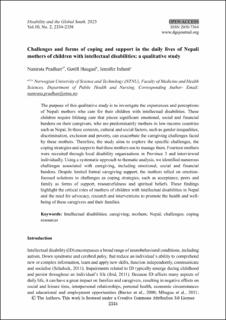Challenges and forms of coping and support in the daily lives of Nepali mothers of children with intellectual disabilities: A qualitative study
Peer reviewed, Journal article
Accepted version
Permanent lenke
https://hdl.handle.net/11250/3097448Utgivelsesdato
2023Metadata
Vis full innførselSamlinger
Originalversjon
Disability and the Global South. 2023, 10 (2), 2334-2358.Sammendrag
The purpose of this qualitative study is to investigate the experiences and perceptions of Nepali mothers who care for their children with intellectual disabilities. These children require lifelong care that places significant emotional, social and financial burdens on their caregivers, who are predominantly mothers in low-income countries such as Nepal. In these contexts, cultural and social factors, such as gender inequalities, discrimination, exclusion and poverty, can exacerbate the caregiving challenges faced by these mothers. Therefore, the study aims to explore the specific challenges, the coping strategies and supports that these mothers use to manage them. Fourteen mothers were recruited through local disability organisations in Province 3 and interviewed individually. Using a systematic approach to thematic analysis, we identified numerous challenges associated with caregiving, including emotional, social and financial burdens. Despite limited formal caregiving support, the mothers relied on emotion-focused solutions to challenges as coping strategies, such as acceptance, peers and family as forms of support, resourcefulness and spiritual beliefs. These findings highlight the critical roles of mothers of children with intellectual disabilities in Nepal and the need for advocacy, research and interventions to promote the health and well-being of these caregivers and their families.

